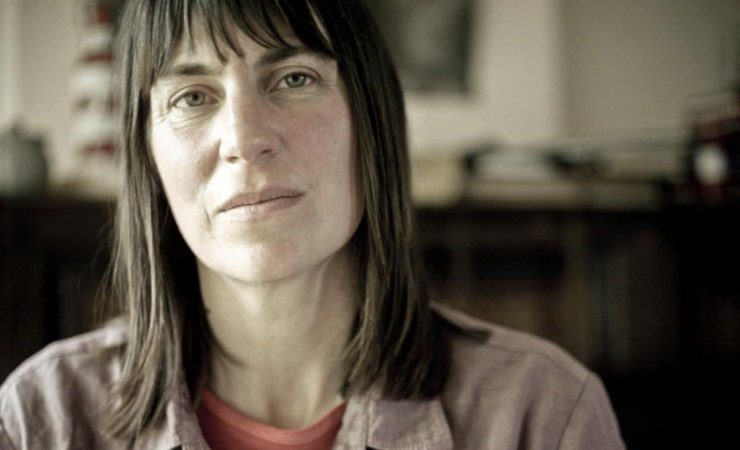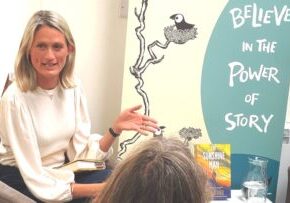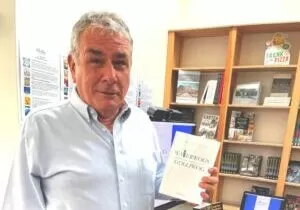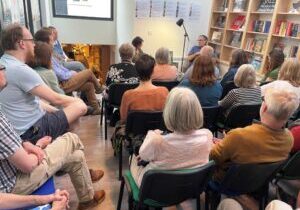Alice Oswald is the new CCB Patron
CCB is pleased and proud to announce a new patron, one of England’s greatest poets, Alice Oswald. Alice was trained as a classicist at New College, University of Oxford. Her first collection of poetry, The Thing in the Gap-Stone Stile (1996), received a Forward Poetry Prize for Best First Collection. Her second book, Dart (2002), was the outcome of years of research into the history, environment, and community along the River Dart in Devon. Oswald’s other collections of poetry include Woods, etc. (2005), winner of a Geoffrey Faber Memorial Prize; Weeds and Wild Flowers (2009), illustrated by Jessica Greenman; A Sleepwalk on the Severn (2009); and Memorial (2011), a reworking of Homer’s Iliad that has received high critical praise for its innovative approach and stunning imagery, which won the 2013 Warwick Prize for writing. Oswald was the first poet to win the prize. Her latest book is Falling Awake (2016). Oswald’s many honours and awards include an Eric Gregory Award, an Arts Foundation Award for Poetry, a Forward Prize for Best Single Poem, and a Ted Hughes Award. She lives in Devon with her husband and three children. (Credit: The Poetry Foundation).
Dart | Alice Oswald | CCB Review
If you’re a lover of nature, poetry, Devon, or all of the above, you’ll love this book-length poem. Alice Oswald’s Dart follows the course of the river from its source to its mouth, meandering through villages and people in the heart of Devon. Oswald’s instruction to read the voices as the “river’s mutterings” is monumental in shaping the way in which you read the poem – so take note!
The characterisation of the river is complex, created by the human community living alongside it and the landscape it cuts through. The multi-faceted voice of the river is observational; it does not shy away from the harshness of the landscape and the resolute attitude required to make a living along its banks. By avoiding in-depth expression of feeling, the poem is driven forward like the perpetual motion of the river itself, words sometimes tumbling over themselves like rapids. Dart simultaneously depicts snapshots of life along the river and reveals specific, individual identities such as the fisherman, the naturist and the sewage worker. These characters, while uniquely portrayed in rhyme, meter and language, are given unity by the voice of the river – a constant and vital part of their lives.
I love the way in which the poem adapts the tone to each character: the eel’s flowing movements are echoed in iambic pentameter and the language of the sewage worker is blunt, colloquial and grim: “a stink-mass of loopaper and whathaveyou”. Amidst the diverse descriptions, Oswald slips in her own light-hearted and witty words, such as “outcanoevre”, at which you just can’t resist smiling.
For locals, the familiarity of the named locations and the classically-named boats is heart-warming: “Sandyhole, Sittaford, Hartyland, Postbridge”. And yet the occupations encountered are not only found along the Dart. Although Dart naturally appeals to people who know the area, the generic occupations highlighted along its course are universally relatable.
Whilst the poem is rooted in history and folklore (the drowned man who haunts the Dart, the waternymph and the dead tinners whose names overflow in a splurge on the page), Oswald creates a sense of discovery as the river travels down its path – almost as if you are one droplet of water experiencing it all for the first time. The dialogue between the river and the people, “who’s this moving alive over the moor?”, adds to this exploration. Our own curiosity resonates in the river’s questioning.
Despite being stylistically different from many of Oswald’s poems, Dart perfectly renders her ability to turn a landscape into a language-scape without losing its essence, making nature the keystone feature of the poem. She remains detached from her avoided ‘nature poet’ title through her babbling expression of humanity. Oswald has truly succeeded in completing an ‘aboriginal songline’ that lets the voices of the community speak for themselves. Through her lyrical language and the rustic, honest and analytical perceptions of the waternymph, the walker and the dairy worker, Alice Oswald has produced a stunning portrayal of the river and its necessity for our survival.
Order a copy of Dart from our Bookshop.org affiliate shop.
June 28, 2017
Blog > News > Alice Oswald – CCB Patron














